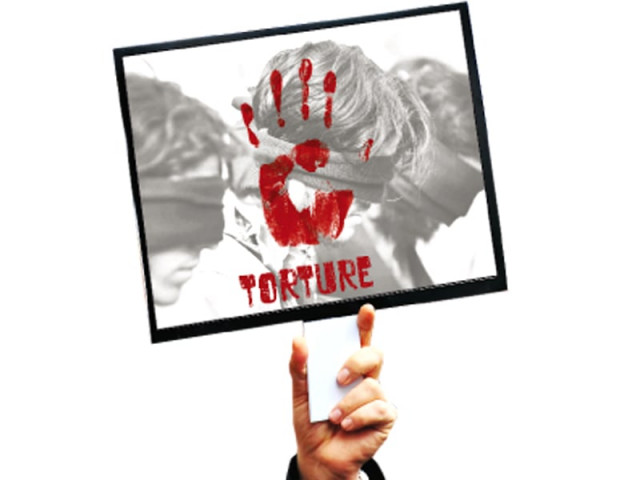Conference on torture: ‘Police are biggest torturers’
‘Physical abuse of suspects and families most common investigation method’.

Rights activists have stressed the need to raise public awareness about all forms of torture, by both the state and non-state elements, to ensure that they are recognised as illegal and immoral and are abolished.
Many people consider torture at the hands of law enforcers justified and victims of such torture often seek no remedy because they don’t think that anything will be done, said speakers at a roundtable conference titled Attaining Justice: Synergising Efforts for Ending Torture and Ill Treatment in Pakistan, organised by Women In Struggle for Empowerment (WISE).
Human Rights Commission of Pakistan Executive Director IA Rehman said most people didn’t even realise they have been tortured. For instance, he said, handcuffing an accused was a type of torture, but most people didn’t consider it so. He said there was no legal provision allowing the police to handcuff an accused. The police were only allowed to put a hand on the suspect’s shoulder and inform him that he is under arrest.
(Read: Control and confession by torture)
He said in Pakistan, physical torture was considered the only way to investigate a case. He said this practice must end now. Apart from being immoral, the method was ineffective, since victims of torture were willing to confess to crimes they didn’t commit in order to end their ordeal.
Rehman said that the government also needed to define torture. He said police officials could not be spared on the plea that they tortured someone on the orders of superiors. He said bonded labour was also a type of torture. Though a law against bonded labour was passed in 1992, rules in this regard were not formed till 1995. He said once the rules were formed, there was no forum to implement the rules. Likewise, he said the law for freedom of expression was formed in 1996, but so far no rules had been formed in this regard.
Justice (retired) Nasira Javed Iqbal, a member of the board of trustees at Transparency, said that it was common practice for police to arrest the family of an accused and subject them to torture till the suspect came forward. She said torture under the garb of bonded labour was common even in Lahore. She said police and landlords had set up private torture cells. She said the police were the biggest torturers. She said there was no justification for torture.
She said 80 per cent of Pakistani women were subjected to one form of torture or another. She said some of the worst physical torture was practised in madrassas. The blasphemy law was also a tool of torture, she said.
Justice (r) Iqbal urged rights activists to identify all types of physical and mental torture. She said victims of police torture were often too scared to approach the courts as they feared further action by the police. She suggested amendments to the Police Order to include penalties against torture. She said women and children were most vulnerable to torture.
Munawar Ali Shahid, provincial partner of the Asian Human Rights Commission, said the victims of torture were often poor and downtrodden. He said “ignorance and illiteracy” encouraged the use of torture. He said that the AHRC had formed an alliance of 14 Asian countries against torture.
Published in The Express Tribune, October 21st, 2011.



















COMMENTS
Comments are moderated and generally will be posted if they are on-topic and not abusive.
For more information, please see our Comments FAQ